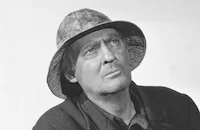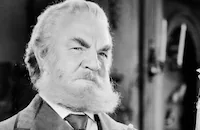The Washington Masquerade

Brief Synopsis
Cast & Crew
Charles Brabin
Lionel Barrymore
Karen Morley
Diane Sinclair
Nils Asther
Reginald Barlow
Film Details
Technical Specs

Synopsis
Following his successful attempt to petition the governor for a pardon for a boy wrongly convicted of murder, attorney Jefferson Keane is welcomed home as a hero. Though Jeff doesn't care much for politics, he accepts the invitation of fellow Bar Association members to run for the United States Senate against the bombastic incumbent, Senator Bitler. Jeff wins the election, incurring the ire of Bitler and his cohorts, and becomes the butt of Washington newspapers' jokes about "the new Lincoln." The jokes soon subside, when Jeff makes an impassioned speech before a special session of Congress against the control by big business of the nation's resources. Though opponents call his speech "Communistic," visitors in the gallery cheer Jeff, and the press compliments his "plain words by a plain man." Now a celebrity, Jeff is invited to the White House, where he is approached by Consuela Fairbanks, a Washington hostess who had earlier snubbed him. Lying that she heard his speech from the gallery, Consuela begins to pursue Jeff, inviting him to parties and pretending to be attracted to him. Jeff, who has been a widower for many years, admires the attentions of a beautiful young woman and dismisses his daughter Ruth's reservations about Consuela's motives. Soon Consuela charms and seduces Jeff into a marriage that she hopes will help her financially. Not long after their marriage, Consuela gives a dinner party which Henri Brenner, her former lover, attends. She rejects Henri's advances at first, but some time later they resume their affair. Meanwhile, after confessing to Jeff that she is terribly in debt, Consuela urges him to resign from the Senate and accept a lucrative position with the law firm of Alan Hinsdale, a businessman whom Jeff has always mistrusted. At first Jeff wants to believe that Consuela's high opinion of Hinsdale is justified, but he gradually realizes that Hinsdale is using him to front for illegal activities. When Jeff comes home early one day and interrupts Consuela and Henri in a compromising position, he realizes that Ruth had been right all along. After Consuela leaves him, Jeff goes to Ruth, who urges him to fight a new Senate investigation of his relationship to Hinsdale and his secret partner, former Senator Bitler. At the Senate hearings, old friends from home stand by Jeff, as does Ruth, but the strain of testifying weakens his heart. After an impassioned plea in which a faltering Jeff says that he was guilty of bribery, but that Hinsdale has betrayed the people of the United States, Hinsdale's cause is turned over to the Attorney General for prosecution. The strain of the speech causes Jeff's heart to give out, though, and he collapses. After Jeff dies, his friend Stapleton tells Ruth, "he loved his country well enough to die for it."

Director
Charles Brabin
Cast

Lionel Barrymore

Karen Morley

Diane Sinclair

Nils Asther
Reginald Barlow
William Collier Sr.
William Morris

Rafaela Ottiano

C. Henry Gordon

Burton Churchill

Henry Kolker

Hattie Mcdaniel
Charles Coleman
Crew

Film Details
Technical Specs

Articles
Washington Masquerade
By Frank Miller

Washington Masquerade
Quotes
Trivia
Notes
Pre-production titles of the film included Public Life, and Washington Whirlpool. Motion Picture Herald and Hollywood Reporter reviewed the film respectively under the titles Washington Show and The Washington Show. Motion Picture Herald called The Washington Masquerade the first in a cycle of new political films. Lionel Barrymore played the lead in the Broadway production of The Claw, which reviews note was one of his most successful plays. The New York Times review also mentions that in the play, the Barrymore character was French and a more tragic figure than the film's "vigorous American, flavored with humor and not a little gusto."














